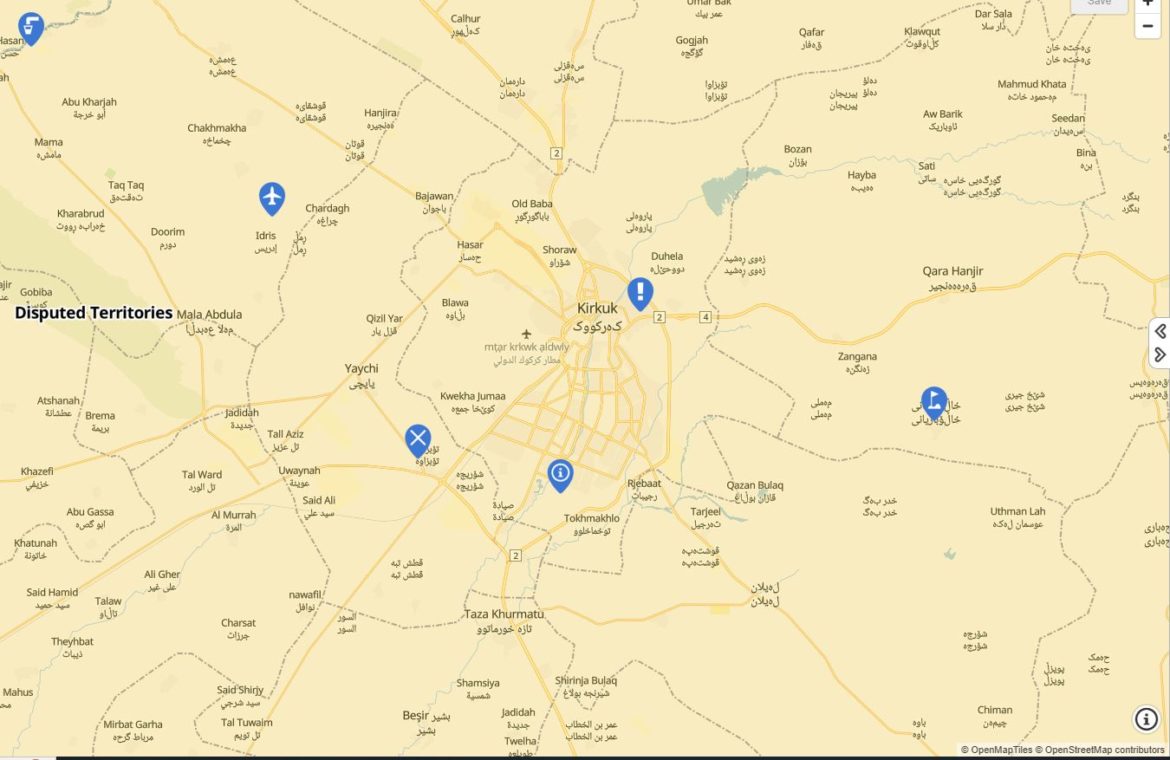1.6K
A weekly brief of events and news occurred in the disputed territories.
Kirkuk
- As the provincial election draws closer, tensions escalate among the political parties representing Kirkuk’s various components. On May 23, several Arab and Turkmen parties held a joint press conference, accusing Kirkuk’s Electoral Commission of favoring the Kurdish community. These parties demanded a “redistribution of posts” within the commission. In response, 14 Kurdish political parties held a press conference on May 24, dismissing these allegations as “baseless statements” and presented statistics showing that senior positions in the commission and other government departments are predominantly held by Arabs and Turkmen. Regarding the Electoral Commission, the Kurdish parties claimed that it was equally divided, with four positions for each ethnic group and one for Christians. Additionally, the Kurdish parties reiterated their opposition to the new election laws for the province and threatened to organize massive protests if the supreme court does not annul these “unconstitutional” laws that were adopted by the parliament. Kirkuk is eagerly awaiting a crucial election after an 18-year gap since the last one held in 2005.
- On May 27, the Iraqi army entered the village of Topzawa in southern Kirkuk, disrupting a farmer’s harvest and confiscating their plough machines. As a result, on May 28, villagers staged a demonstration on the main street in front of the Kirkuk airport to protest the provocative behavior of the Iraqi army. The army has been attempting to seize agricultural land belonging to Kurdish and Turkmen farmers in the area for the past six months, intending to convert them into military compounds under the claim that the land belongs to the Ministry of Defense. However, these lands originally belonged to native Kurds and Turkmens, but were taken away by the former Ba’ath regime as part of their Arabization policies in Kirkuk.
- On June 1, the State Organization for Marketing of Oil (SOMO) released statistics on Iraqi oil exports, revealing that no oil was exported from Kirkuk fields in April, marking the second consecutive month without exports. This situation arose after an Iraqi lawsuit halted independent oil exports from the Kurdistan region, which also affected Kirkuk, resulting in a loss of over $1.5 billion for Iraq. Kirkuk’s oil exports, which pass through Kurdistan’s pipeline, are routed via Turkey. On a positive note, oil exports to Jordan resumed on May 31 after a two-month suspension due to the expiration of the contract between the two countries.
- On May 29, the Iraqi Integrity Commission summoned the former director of the Kirkuk Investment Board on charges of issuing investment licenses and encroaching on properties belonging to the Ministry of Finance. Although the Commission did not disclose the official’s name, they stated that the individual currently holds the position of director general of the Office of War Industry Research and Development.
- On May 23, the Kirkuk police implemented drone surveillance for the wheat and barley harvest season in response to a recurring pattern of crop fires during this period over the past six years. Arson targeting farmlands is primarily attributed to ISIS (Da’esh) terrorists. In a separate development on May 27, a joint military operation was carried out by the Iraqi army and Peshmerga forces along the border of Laylan and Qarahanjir districts. The army conducted searches in areas ranging from Shirin Dam in Leylan district to Jabal Bor and Khalobaziani village, while the Peshmerga forces focused on Kawala village in Qarahanjir district and both sides of Khalobaziani village. This region has witnessed an increase in Da’esh activities in recent months. Concurrently, a high-level security delegation arrived in Kirkuk to oversee the security situation and monitor the joint operation between the army and Peshmerga. The Ministry of Defense confirmed that two helicopters were deployed to monitor the operation. Despite the physical defeat of Da’esh, the terrorist group continues to carry out attacks, particularly in areas where Peshmerga forces were removed by the Iraqi army on October 16, 2017.
Khanaqin
- The Peshmerga forces assumed responsibility for providing security during the wheat and barley harvest season in Khanaqin. Lieutenant Colonel Jalil Fayeq, the head of the second battalion of the third infantry brigade of the Peshmerga forces, stated that they have been deployed in over 10 villages in Khanaqin to ensure the security of the harvest season. The Peshmerga forces’ deployment covers areas from the open regions to Salih Aga areas in the Kalar district.
Tuz Khurmatu
- On May 27, a joint operation involving the Peshmerga and the Iraqi army was conducted in Tuz Khurmatu. The Peshmerga Ministry issued a statement describing the operation as “extensive” and aimed at addressing the security vacuum between the district and the Garmian areas. The operation involved the participation of infantry brigades 3, 5, 9, 16, 17, 22 from the Peshmerga Ministry, the 731st Brigade of the 70th Forces, Garmian Security, and an anti-terror force.
Makhmour
- Following a recent attack on the Makhmur camp by the Iraqi army on May 21, the army began constructing trenches around the camp to secure its surroundings, despite protests from camp residents. The Makhmur Camp houses Kurdish refugees from Turkey who fled government persecution in the 1990s. The Iraqi army’s actions were justified on the grounds that the camp had been exploited by the Kurdistan Workers’ Party (PKK).
Shingal (Sinjar)
- On June 1, a Turkish drone targeted the headquarters of the Sinjar Resistance Units (YBS) in the Shingal district. According to the Kurdistan Anti-Terrorism Agency, the attack resulted in injuries to two members of the YBS. Turkish drones consistently target Yazidi forces, claiming their connection to the PKK.

